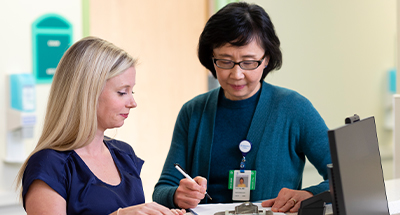Childhood Diabetes Center
Nationally ranked by U.S. News & World Report


Childhood Diabetes Center
Nationally ranked by U.S. News & World Report


The Children's Mercy Diabetes Center provides comprehensive care for patients and families managing childhood diabetes. We create treatment programs that empower patients to effectively self-manage their diabetes and we continue to pursue studies that lead to new, more effective ways to treat and prevent diabetes. View current studies at ClinicalTrials.gov.
Our faculty and staff take a team approach to provide the best care possible for children with type 1 diabetes (juvenile diabetes) or type 2 diabetes. We are always seeking to improve access to care by using technology, such as telemedicine, to make it easier for families to connect with their health care team at Children's Mercy.
What is diabetes?
Type 1 diabetes is a disorder where the body does not make enough of a hormone called insulin. Type 1 diabetes is also called insulin-dependent diabetes or juvenile diabetes. Type 1 diabetes usually starts in childhood or early adulthood. It is treated with insulin injections, which help control blood sugar levels.
Type 2 diabetes (non-insulin dependent diabetes) is not the same as type 1 diabetes. The bodies of people with type 2 diabetes may produce insulin, but it may not be enough or may not be able to be used properly. Type 2 diabetes may be treated with pills instead of insulin shots. Type 2 diabetes is usually linked to being overweight. It is becoming more common in children ages 10 to 18 years old.
Type 2 diabetes can be prevented and even reversed when it's identified early. Learn more about our Type 2 diabetes prevention clinic.
Symptoms of diabetes in children
Type 1 diabetes symptoms include:
-
Urinating frequently. For example, some children wet the bed when they didn't before.
-
Being thirsty and drinking a lot of fluids.
-
Losing weight without trying.
Type 2 diabetes may cause the following symptoms, but most people have no symptoms, often for months or even years:
-
Increased urination.
-
Increased thirst.
-
Blurry vision.
-
Unexpected weight gain or weight loss.
-
Frequent infections. For example, of the skin, gums, or bladder.
-
Frequent yeast infections of the vagina.
-
Tiredness or fatigue.
-
Infections of the foreskin in uncircumcised males.
Your appointment
Here's what you need to know about what to expect during your child's appointment and what you will need to bring.
-
Blood glucose meter.
-
Insulin pump.
-
Continuous glucose sensor.
-
Blood glucose, insulin pump or continuous glucose sensor home downloads.
-
Food to treat low blood glucose.
Tests and measurements
We want to ensure that your child maintains optimal growth and development along with optimal diabetes control. Your child will have the following measures performed at each appointment:
-
Height
-
Weight
-
Height and weight calculated for Body Mass Index (BMI)
-
Blood pressure
-
Hemoglobin A1c
Annual screenings
Children with diabetes are at risk for developing complications. Once a year, children will need to have additional screening tests performed to detect early complications. These tests may include:
-
Thyroid function tests
-
Celiac panel
-
Lipid profile to help detect cholesterol problems
-
Urine test for microalbuminuria
The center also recommends your child receive dental exams every six months to ensure optimal dental health. Annual dilated eye exams are recommended once your child is 10 years old.
Refilling prescriptions
The diabetes team will renew your prescriptions at each appointment. However, should you need to request a prescription refill in the interim, please contact your pharmacy. It may take up to seven days to process prescription refill requests that require prior authorization.
We understand that reshaping your family's lifestyle to accommodate a child with diabetes is a big adjustment. That's why Children's Mercy offers new-onset diabetes education to families in a series of three outpatient visits. Each visit includes both your child's doctor's appointment and hands-on educational sessions with our Certified Diabetes Educators. In between appointments, you'll have time to practice what you've learned and ask questions anytime by phone or at your next visit.
When your child is in school we understand the importance of your child being well cared for. Our diabetes team and social workers offer guidance and support in helping you to establish a health plan at school. This ensures your child's needs are met and discrimination is eliminated. We assist in developing a relationship with your child's school nurse and offer education and resources.
Type-1 diabetes: Mason's story
A thirsty 2-year-old isn’t likely to arouse concerns – especially during the brutal heat of a Midwestern summer. But Mason Brennan’s mother knew something was amiss when her son’s requests for water became excessive.
Contact the Diabetes Center Team
We are here to help you. Please contact your care team at (816) 960-8803 for any of these needs:
Non-emergencies: For non-emergent needs (reporting blood glucose readings, prescription refills and general inquiries), call or send a message through the Patient Portal. Routine medication refills are handled during normal business hours.
Urgent needs: For urgent needs (ketones, vomiting, or unable to eat), call (816) 960-8803 and choose option #2, available Monday - Friday from 8 a.m. - 4:30 p.m.
After hours: For emergencies after hours, on weekends, or holidays call (816) 234-3188 and ask to speak with the endocrine/diabetes physician on call.
To cancel an appointment: Please call (816) 960-8803 to cancel an appointment.
Below are links to resources and national organizations that may be helpful for patients with diabetes.
